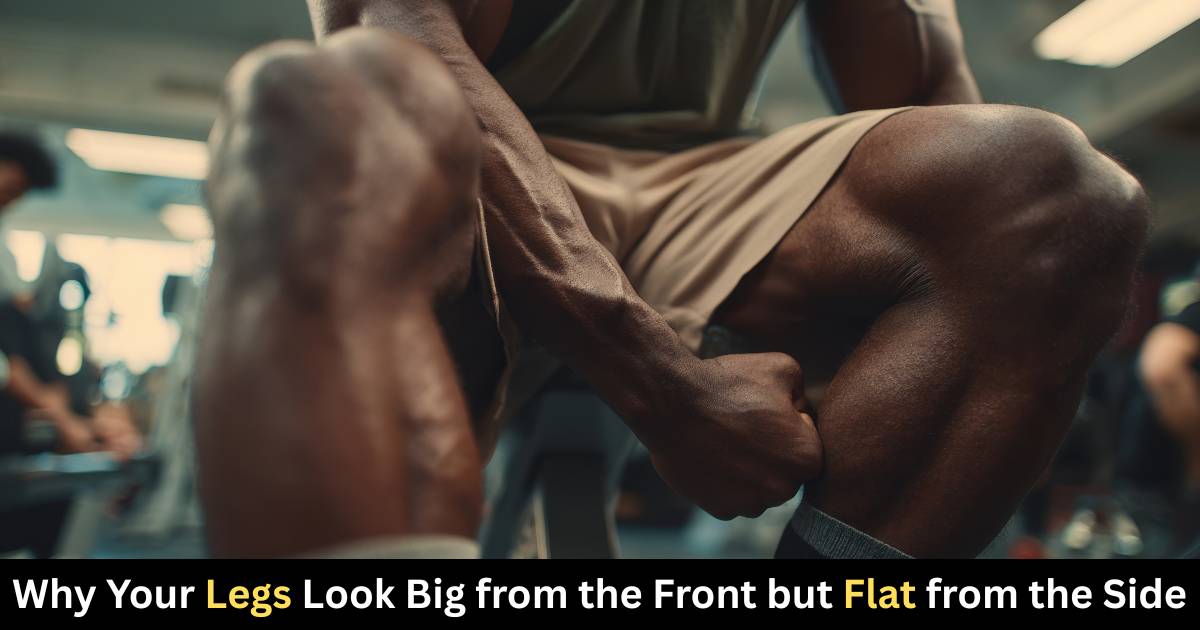Have you ever stood in front of the mirror and thought, “Why do my legs look thick from the front but totally flat from the side?” You’re not imagining it — it’s a real and common issue for many people. The good news? It’s fixable.
This visual imbalance usually happens because of muscle imbalances, fat distribution, and even small everyday habits you don’t realize are affecting your body’s shape. In this article, we’ll break down why this happens, what daily activities cause it, and most importantly, how to fix it through training, nutrition, and lifestyle adjustments.
The Visual illusion: Big from the Front, Flat from the Side
From the front, your quadriceps (the big muscles in front of your thighs) are most visible. These are naturally larger muscles and tend to develop faster with regular movement, climbing stairs, cycling, or squats. So when you look head-on, your legs appear strong and thick.
From the side, however, the shape depends largely on your hamstrings (back of your thighs) and glutes (butt muscles). If these are underdeveloped, the side profile looks flat — even if your legs are muscular overall.
In short:
- Front View = Dominant Quads
- Side View = Underdeveloped Glutes and Hamstrings
How Daily Habits Create This Imbalance
You don’t have to be a bodybuilder to develop uneven leg appearance. Many common everyday routines contribute to it over time:
1. Sitting Too Much
When you sit for hours (especially if you work a desk job), your glutes “turn off” — a condition called “glute amnesia.” Meanwhile, your hip flexors and quads stay tight and overactive. The result? Big quads, flat glutes.
2. Walking or Running on Flat Surfaces
Walking or jogging primarily activates the quads and calves, not the hamstrings or glutes. Without incline or resistance, your side muscles don’t get the same level of engagement.
3. Only Doing Squats
Squats are great, but they’re quad-dominant exercises. If your routine only includes squats and leg presses, you’re overtraining the front and neglecting the back.
4. Poor Posture
An anterior pelvic tilt (hips tilting forward) can flatten your glutes and make your thighs appear even bulkier in front. It’s a subtle posture issue that affects your body’s overall symmetry.
5. Genetics and Fat Storage
Some people naturally store more fat in the front of their thighs due to genetics or hormones, making the front appear bigger while the side remains lean.
How to Check If You’re Quad-Dominant
A simple way to test:
Do a few bodyweight squats in front of a mirror.
- If you feel more burn in your front thighs than your glutes, you’re likely quad-dominant.
- If your knees push too far forward during squats, it’s another sign your quads are doing too much work.
Fixing the Flat-Side Look: Building a Balanced Lower Body
To create a rounder, more proportionate leg shape, you’ll need to retrain your body — strengthening your hamstrings and glutes while reducing quad dominance.
1. Strengthen the Posterior Chain
Focus on exercises that target your hamstrings and glutes, such as:
- Romanian Deadlifts (RDLs) – Build hamstring thickness and improve side profile.
- Hip Thrusts or Glute Bridges – Add curve to your glutes.
- Hamstring Curls – Strengthen the back of your thighs for fuller legs.
- Step-Ups or Bulgarian Split Squats – Activate glutes evenly.
Train these 2–3 times a week. You’ll start to see visible changes in 4–8 weeks with consistency.
2. Stretch and Activate Before Workouts
Before leg day, activate your glutes with:
- Glute kickbacks
- Banded side walks
- Single-leg glute bridges
Then stretch your hip flexors and quads to reduce tightness and improve muscle balance.
3. Fix Your Posture
Stand tall, engage your core, and slightly tuck your pelvis to prevent your hips from tilting forward. This simple change enhances your leg shape instantly and improves how your muscles develop over time.
The Role of Diet in Leg Appearance
You can’t out-train a poor diet. Fat distribution and muscle visibility heavily depend on your nutrition.
1. Eat Enough Protein
Muscles need protein to grow and repair. Aim for at least 1.6–2.0g of protein per kilogram of body weight daily.
Great sources: eggs, chicken, fish, tofu, and Greek yogurt.
2. Balance Calories
If you want fuller legs from the side, you need to build muscle, not lose weight. That means eating in a slight calorie surplus (100–300 extra calories/day).
3. Hydration and Sodium Balance
High sodium intake can make the front thighs look bloated. Drink plenty of water and reduce processed food to minimize puffiness.
4. Include Healthy Fats
Omega-3 fats from fish, nuts, and olive oil help reduce inflammation and support better muscle tone.
Lifestyle Habits to Support Recovery and Growth
- Sleep 7–9 hours every night for muscle repair.
- Massage or foam roll your quads and glutes to release tension.
- Take short breaks from sitting every hour to activate your muscles.
- Add light stretching after workouts to prevent tightness and improve blood flow.
How Long Does It Take to Fix?
With consistent strength training and proper nutrition, you can start to notice a difference in 4–6 weeks. However, complete transformation — where your legs look fuller from every angle — might take 3–4 months depending on your body type and routine.
Remember: small changes in your workout focus can lead to big differences in your shape.
Bonus: Styling Tips to Improve Appearance Instantly
While you work on building your legs, a few quick style hacks can also help:
- Choose mid-rise or high-waist pants that accentuate glutes.
- Avoid tight, front-stretch fabrics that flatten curves.
- Opt for darker shades on thighs to balance proportions visually.
Click the ‘Watch Now’ button to watch the full video…….

Video
Post no 01

Video
Post no 02

Video
Post no 03

Video
Post no 04

Video
Post no 05

Video
Post no 06

Video
Post no 07

Video
Post no 08

Video
Post no 09

Video
Post no 10

Video
Post no 11

Video
Post no 12

Video
Post no 13

Video
Post no 14

Video
Post no 15

Video
Post no 16

Video
Post no 17

Video
Post no 45
